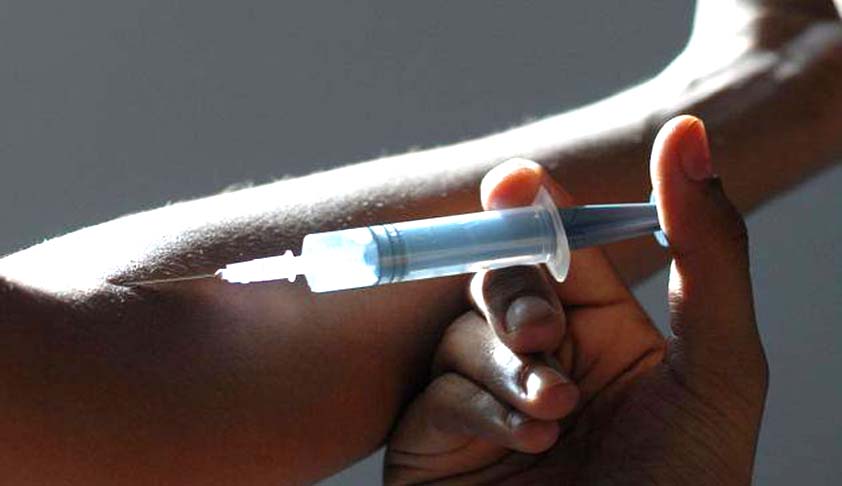Judicial Intervention To Limit Drug Abuse & Trafficking
Smita Chakraburtty
27 March 2017 12:49 PM IST

Two teenagers uncovered an international trafficking racket. Tejasweeta Pradhan (17yrs) and Shivani Gond (16 yrs), are members of the Students Against Trafficking Club (SATC). A minor girl who had gone missing from Nepal was traced in Delhi by Darjeeling based NGO, Mankind in Action for Rural Growth, MARG.
Thereafter Tejesweta and Shivani started tracking the minor, working closely under the supervision of MARG and the police administration. An international sex racket had trapped the minor and brought her to Delhi, from where Shivani and Tejasweeta helped rescue her. Tejasweeta and Shivani later received the National Bravery Award from the Indian Council for Child Welfare, for their act of bravery.
The Calcutta High Court judges Justice Aniruddha Bose and Justice Joymalya Bagchi, felicitated the two girls on March 18 in Darjeeling at a seminar arranged by the West Bengal State Legal Services Authority (WBSLSA) on trafficking and drug abuse.
But this is just one success story.
WBSLSA seminar on drug abuse and trafficking was initiated as a confidence building measure between the local youth and the district administration. The seminar stressed on opening conversations regarding the problems related to drug abuse and human trafficking. Both the District Magistrate and the Superintendent of Police assured support to the youth and pledged to work closely with the community to address the problem.
The problem with both trafficking and drug abuse is that it cannot be detected at an early stage. Again, both suffer social taboos and in both cases victim shaming is almost an impulsive social response. As a result victims shy away from asking for help or even in cases where they do, they are shunned away.
Justice Aniruddha Bose, Executive Chairman of the WBSLSA and Justice Joymalya Bagchi, Judge In-Charge of Darjeeling district, spoke of de-stigmatising the victims of trafficking and/or drug addiction. They encouraged the students to speak about a drug problem which either they have or someone they know have. The teachers and parents were also advised to be patient and support a person having an addiction problem, through the process of de-addiction and recovery. Justice Bagchi, further added “addiction is a disease, if a person becomes addicted then instead of stigmatizing the disease s/he should be sent for treatment. Just like one does in case of any other disease’.
The judges further spoke of devising a socio-legal strategy of combatting the growing menace of trafficking and drug abuse amongst youngsters. The District Legal Services Authority is to act as the nodal point between the police administration and the civil-society, who will work in collaboration with each other to actively combat the growing menace of drug abuse and human trafficking.
It is the first of its kind initiative where community participation was fortified and the police was encouraged to engage with the community in order to help stop the problem from accelerating. A special unit of Drug Rehabilitation Centre was inaugurated at the Darjeeling District Hospital on the same day by the Calcutta High Court Judges.
Disturbing trend
Addiction is a slippery slope. No one plans to become an addict. Experts say lack of social support and apathy leads to addiction development. There is a pattern in addiction development, usually youngsters start experimenting with drugs out of curiosity, which over a period turns into addiction.
There is a growing trend of drug abuse especially among school and college going students in Darjeeling district. Experts have warned that lack of awareness among family members and teachers regarding substance abuse and addiction may take a toll on the future of the society.
There is a taboo related to substance abuse and addiction. Often instead of sending the addicted person for treatment at rehabilitation centre, families try to hide addiction problem by attempting to curb the disease at home. Parents have also been found to deter de-addiction treatments, as the treatment breaks the academic cycle of the student. Such myopic perceptions regarding treatments also lead to aggravating the addiction and induces frequent relapse.
Drug abuse is on the rise across the country, it isn’t a problem restricted to a certain district or a state alone. According to 2015 Narcotics Control Bureau report, seizure of hashish (which is a mood altering substance) alone is around 3 tons every year in the country. In early 2015 officers of Customs, Preventive & Intelligence Unit, Siliguri intercepted two parcels and seized 5.960 kg of hashish at Darjeeling. In the same year West Bengal accounted for the maximum land area under illicit cultivation of opium poppy, a total of 1,899 acres which had to be destroyed.
Human Trafficking
Every year Darjeeling witnesses hundreds of persons migrating to other states in search of job or livelihood. There are several recruitment agencies through which labourers skilled, semi-skilled and unskilled get recruited to a job. But it is difficult to say how or when a person falls into the trap of human trafficking racket. Migrating for the purpose of livelihood is an age old practice, there are several actors involved in the migrations process, from family members to recruitment agencies, to employers. Neither can all the actors be treated as potential suspect nor can a trap be predicted, thus perpetrators are difficult to track.
Trafficking has different purposes and forms, some persons are trafficked are used as bonded labourers and some person are trafficked for the purpose of flesh trade. In the organized crime world of flesh trade and people smuggling syndicates, men, woman, children are all potential preys.
Problem with trafficking is it goes unnoticed for a considerable period of time. By the time it is reported the trafficked person might have crossed state boundary or crossed the international border. There is a lack of coordination and informations sharing between different state police or investigational agencies. Also, an element of stigma is involved where victim shaming is the norm thus return of the victim becomes even more difficult.
According to National Crime Records Bureau (NCRB), the crime of human trafficking during the year 2014 has increased by 59.7% over 2010. Often the victim of trafficking gets trapped in the maze of the criminal justice system resulting in double jeopardy. And when acquitted after a lengthy trial the victim of trafficking suffers double taboo of sex trade and imprisonment.
Community policing to combat drug abuse and trafficking.
There has been phenomenal rise in drug-abuse and human trafficking across the country, Law enforcing agency in Darjeeling is trying out the model of community policing to socially combat the growing trend of drug abuse and human trafficking. The local administration has joined hands with Kripa Foundation and a local NGO, MARG.
Kripa Foundation is a de-addiction and rehabilitation centre and MARG, works on prevention of human trafficking. Through Kripa and MARG the local administration is engaging with the community in an attempt to create a safety net to protect citizens against human trafficking and drug-abuse.
The WBSLSA along with Darjeeling District Legal Services Authority, has planned to conduct programmes on legal awareness and sensitization on drug abuse and human trafficking, involving all the actors from local administration to community participation.
As a primary step the local administration has started distinguishing between a victim of drug abuse and a drug peddler, although previously jail was the fate for both. Now drug addicts are sent off to Kripa, an NGO, for de-addiction treatment and rehabilitation, whereas the peddlers are prosecuted against.
There is, however, a difference between a drug using peddler and a clean peddler. In case a drug using peddler is arrested and shows signs of withdrawal, then again from prison the accused is sent to Kripa foundation for treatment. Unfortunately a drug treatment centre is yet to come up within the prison campus.
Drug abuse and human trafficking is a problem that is growing on an alarming rate across the country but Darjeeling at least has initiated an extraordinary effort to check the menace, thanks to judicial intervention.
 Smita Chakraburtty is a Prisoner Rights Activist, Researcher. She is currently working with Azim Premji Philanthropic Initiatives-APPI as Consultant Specialist on Court and Criminal Justice System.
Smita Chakraburtty is a Prisoner Rights Activist, Researcher. She is currently working with Azim Premji Philanthropic Initiatives-APPI as Consultant Specialist on Court and Criminal Justice System.
[The opinions expressed in this article are the personal opinions of the author. The facts and opinions appearing in the article do not reflect the views of LiveLaw and LiveLaw does not assume any responsibility or liability for the same].


